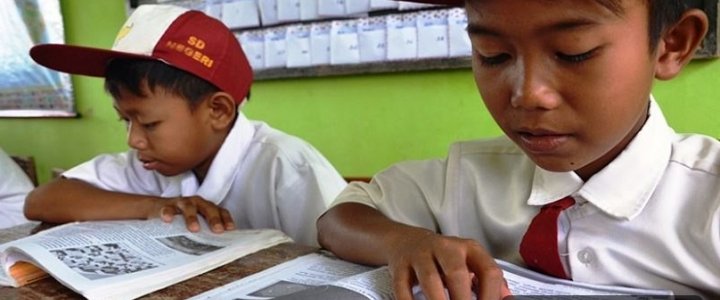“He is a proven leader who has made great contributions to advancing transparency and accountability through robust financial management and reporting practices.” Marc Purcell, ACFID CEO.
As part of our wrap-up on the Spotlight on Quality Principle 8, we interviewed ChildFund Australia’s CEO on his personal perspectives of embedding and implementing best practices related to risk, partnerships, donations and reporting. After 7 years of serving as ACFID’s Treasurer, Nigel is stepping down later this year.
What does Quality Principle 8 mean to you?
Quality Principle 8 is about exercising good stewardship with the resources entrusted to an NGO. It is a daunting obligation.
Funds come from an array of donors with diverse expectations, all are entitled to feel confident in our management regardless of the size of donation. The intended beneficiaries, our primary stakeholders, rightly expect us to apply the funds to get the best possible outcomes, acting together with them and on their behalf. All of this happens in an environment where NGOs are typically resource-poor, operating in high risk environments and with complex partnership arrangements. It’s obviously one of the biggest responsibilities we have and carries some of the biggest risks.
Throughout your career, how have you contributed to making the organisations you lead transparent and accountable through robust financial management and reporting?
Starting out as a trainee social worker who couldn’t pass economics, I was hopeful of a career without numbers. But the reality quickly dawned that financial literacy is essential. I’ve had to put in a lot of time over the years learning about accounting, financial reporting and audits. Now that I can read a balance sheet I’m surprised how many can’t.
A lot of my approach with the team at ChildFund, and in previous organisations, has been to: develop financial capacity within the organisation; establish a robust reporting and review cycle; and build a comprehensive framework of policy, systems and controls.
Participation in the annual budget process and monthly review of management accounts should be part of every middle and senior manager’s role. We have made this a widespread practice at ChildFund. Monitoring the financial health of the organisation and ensuring efficient use of resources requires lots of people to have their finger on the pulse, not only the finance team. That said, there’s no avoiding the fact that you need highly competent, experienced finance staff. It’s not possible to feel confident about resource management if there is weakness in that part of the organisation.
A strict financial management cycle is at the centre of good resource management. ChildFund follows a conventional approach of monthly management accounts reviewed by senior management, quarterly review by a highly-informed, proactive Finance & Audit Committee, followed by another review by the full Board. Annual audits in all locations where ChildFund Australia operates and periodic internal audits and financial monitoring visits form part of the cycle. Sticking strictly to these disciplines sets the right culture for the organisation.
Part of ChildFund’s journey for more than ten years has been to construct a robust and comprehensive set of policies, systems and processes that strengthen management and control of financial risks. This has been a massive effort by the ChildFund team, overseen by the Board, that has put in place:
- Several versions of a risk management policy and related procedures, aimed at grounding risk assessment in everyday practice and giving senior management and Board the confidence, and the means, to monitor and mitigate the big threats.
- A detailed delegation of authority schedule codifying levels of decision-making and approval.
- A new finance manual.
- New and updated policies on: fraud and corruption; conflict of interest; corporate engagement; procurement; investment management; reserves; counter-terrorism; list-checking (proscribed entities); partner assessment; asset management; security management; complaints and whistleblowing.
Along with this expanding finance and risk framework has been a new regime of induction, training and ‘policy refreshers’ for staff. The policies and systems are only any good if they are understood and applied!
What are the risks of not having adequate policies and processes in place when it comes to financial reporting and risk?
Most people reading this blog will have taken a similar journey to what I’ve described above. And like me, will probably have sometimes questioned whether it is worth the massive time and organisational effort to create a comprehensive policy framework. Does it truly strengthen financial and risk management? I’m in no doubt it does, but equally sure that it’s not enough. A comprehensive financial and risk management framework is not fool-proof and is never complete. It relies on constant awareness-raising and reinforcement across the organisation. It has to be kept under scrutiny and regularly amended in order to remain relevant and responsive. The ChildFund Board has been very strong in this area and are continually looking at ways to strengthen our systems and controls.
Not having adequate policies and processes is no longer an option for NGOs. Vulnerability to mismanagement or corruption are way too high, and any discerning donor will bypass you.
What about the need for need for due diligence assessments of partners?
I find this one of the most challenging aspects of the Code. It is inherently difficult. Many of ChildFund’s program partners at community and national level have limited capacity. With weak systems and controls the risks are significant. But to choose to only work with high capacity organisations is inconsistent with our purpose. As an international development organisation part of our responsibility is to support local actors in their development.
ChildFund’s current Strategic Plan commits us to work more with local civil society so we have rethought our approach and introduced a new policy and process for partner assessment. The approach requires basic, non-negotiable capacities to be in place (like child protection) and aims to assess risks so that we can go into the partnership clear-eyed about the weaknesses and with strategies to manage these.
How important is it that ACFID members are required to have organisational standards for the acceptance of donations?
My career before ChildFund was in the Australian child protection sector where services are predominantly government funded and public fundraising is a small percentage of revenue. Moving into the international development sector one of my steepest learning curves was (and still is) how to come to grips with the imperative to raise public funds while staying authentic in our messaging and ethical in our methods. The checklist under the Verifier in Commitment 8.1.2 is key to ensuring that ChildFund (and other Members) keep their fundraising practices within acceptable boundaries.
The standard this demands was motivation for ChildFund to overhaul its due diligence process for potential corporate and major donors. We felt that the previous approach was inherently suspicious of corporate support while, at the same time, having a weak vetting process. We have tried to turn that around so that we are proactively seeking corporate partners while having a more stringent assessment criteria and process.
With the increased use of outsourced, third-party fundraisers ChildFund and other Members are exposed to new risks. The Fair Work Ombudsman (FWO) is currently investigating work practices in this area. ChildFund has been sensitive to these risks for a long time. When questions first began to arise in early 2016 ChildFund commissioned an independent legal review of our fundraiser suppliers, their contracts and practices. This resulted in new accountability arrangements between us and our suppliers. But it’s an area that will need more attention and we will be keen to act on the FWO recommendations.
Have you seen ACFID’s Mandatory Guidance on Financial Reporting?
ChildFund finance and communications staff are familiar with the Guidance. It’s such an important part of the Code in ensuring consistent reporting across the sector and maintaining a level of transparency with donors and the wider Australian public.
We have to recognise that trust in NGOs (and other institutions) has declined. We no longer enjoy the same high levels of trust from the Australian public which is causing a lot of ACFID’s members, including ChildFund, to think deeply about our role and ways of working. Concerns about fundraising practices, wastage, inefficiency, fraud and corruption have been contributing factors. These issues have dogged the overseas aid program even though, according to the available data, the amount of funds mismanaged in the sector is extremely small.
The Mandatory Guidance on Financial Reporting and other detailed guidance under Quality Principle 8 gives us a clear roadmap. It is compulsory reading for all CEOs, senior managers and board directors. (Don’t just leave it to the finance manager or chair of the audit and risk committee!) Having the highest possible standards in resource management is a crucial part of retaining and building trust with the Australian public. Most of all, we owe it to our primary stakeholders.

Nigel Spence
Nigel Spence is ACFID Vice President (Finance) and has been the CEO of ChildFund Australia since 2006. At ChildFund, he has overseen the expansion and improvement of ChildFund’s child-focused development programs in Cambodia, Laos, Myanmar, Timor-Leste, Vietnam, Papua New Guinea and other Pacific nations, as well as programs implemented via ChildFund Alliance partners in other regions. Nigel has a long history of working with vulnerable children in Australia and internationally. Prior to his role at ChildFund, he was CEO of the Association of Children’s Welfare Agencies (ACWA) and the Director of Children and Youth Services with Centacare, Catholic Social Services.









